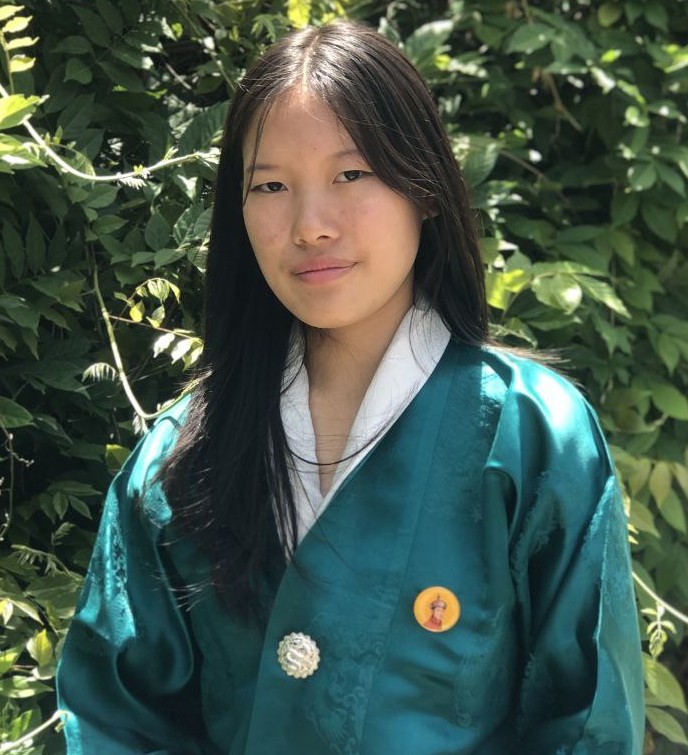
Kinley Dema
A Day in the Life of a Student at Paro College of Education
If you had told me a few years ago that I would be waking up every morning in the quiet hills of Paro, training to become a teacher, I would not have believed it. And yet here I am, just one of the many students at Paro College of Education trying to find my way through lesson plans, assignments, and life in general.
Most of my days start early around 7AM when the hostel slowly comes alive. Alarms go off, and students get ready, brushing their teeth in slippers, and getting ready for breakfast and class. I live with three other girls, and we are like sisters now. We quarrel, laugh, exchange notes, and travel, making the prettiest memories.
The mornings are quiet and peaceful. Sometimes I just go outside to take in the cold air and watch the mountains slowly brighten as the sun rises, which is just enough to set the mood for the day. We don’t require any special therapy, because that alone is a therapy. For the breakfast we get fried rice with (butter/milk) tea and pickle/chutney as a side dish. I rank breakfast number one from the three meals we get, and I never miss it. I need it to carry me through the day.
Classes start at 8:40AM. All the modules are interesting, and tutors make the class more fun. Today’s class was psychology, and that turned into a debate over how children learn and think at different stages. Our lecturer is strict but fair. I like how the classes here don’t just stick to theory. One thing about PCE is that learning isn’t just confined to the classroom. We do a lot of group works and presentations, which at first felt stressful, but now I kind of enjoy that. It pushes me to speak up, listen, and collaborate and somehow know my classmates better. We all come from different dzongkhags, and each person brings their own perspective. Also, it is very practical here. We are not studying just definitions and writing long answers; we are preparing for real classrooms. That entails learning how to negotiate inclusive classrooms, how to handle children with different learning styles, and how to actually design a lesson that will work.
Courses go on until 4PM in the evening. In between there are constant short breaks. We typically use those breaks for washroom visits, stretching, having quick snacks, or catching up with homework. Sometimes, those 15-minute breaks are where the best conversations happen. It can be about education, life back home, future plans, the latest drama, or hostel gossips.
Lunch is usually served around 12:45PM, but the mess gets full and chaotic mostly by 1:15PM. For lunch we get rice with curry. We get different curry every day. For the non-vegan, either chicken, beef, or fish is served twice a week. We also get boiled eggs, curd, and fruits like watermelon as a complimentary. Our mess never fails to feed us the essential nutrients that our body needs.
After the classes, I usually go to the library for a bit of quiet reading and to spend some alone time. It’s the calm and serenity that attracts me to that place. A perfect place for an introvert like me to recharge. Sometimes I just go back to my room and take a shower. Water there rarely runs out; hence, the toilets are always clean, and it is very convenient for us hostlers with a continuous water supply.
The campus is really beautiful. It is green, calm, and open. If you’re ever feeling overwhelmed, just a walk by the river with soft breezes does the work. Like I mentioned earlier, no extra therapy is needed. The sounds of the river flowing, leaves shattering, and the aesthetic evening or night view is enough to calm the busy mind.
Evenings are a mix of things with a bit more relaxed tone. Some students play football, some in the pool, some in the gym, others hang out at the canteen, and some go for walks. I usually spend my evenings in my room finishing up assignments or chatting with friends over a cup of coffee and snacks. Sometimes we complain about deadlines, and sometimes we just laugh at random stuff from the day.
Dinner is simple and light with rice and curry at 7PM. Afterwards we all return to the hostel. If we have group assignments, we meet up at study hall and work on them. Otherwise, it would be laundry with some music, scrolling through phones, or catching up on notes.
Living at PCE is not hard. You only have to manage a few things, like missing home. It’s also the place where I have met some of the closest friends, learned how to sail on my own, and slowly figured out what kind of teacher I want to be.
Paro College of Education might not be for everyone, but it does creep up on most. The view of the mountains in the morning, the peaceful strolls by the river, and the little victories in debates all play their part. At the end of the day, it is these small moments that defines my life.
We are reminded here every day that teaching isn’t a question of conveying facts; it’s about shaping lives. And every lecture, every conversation, every exasperation is shaping us for that. It’s not always easy, and there are days when I feel like I’m swimming underwater and can’t get out, but I know that I’m where I’m meant to be.
If you’re thinking about coming to teach in Bhutan, I would not describe PCE as an extraordinary. But it is real. And it gives you the space to learn, to grow, and to prepare for a career that truly makes you a difference.
